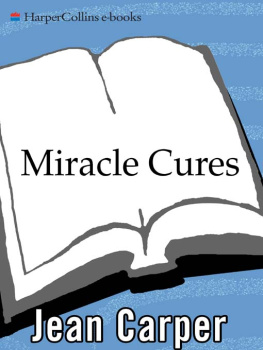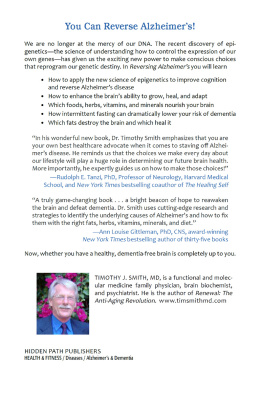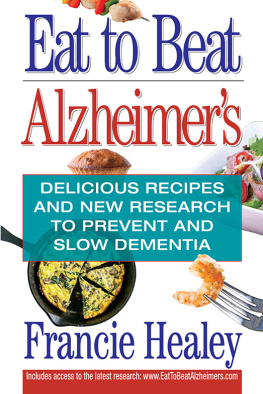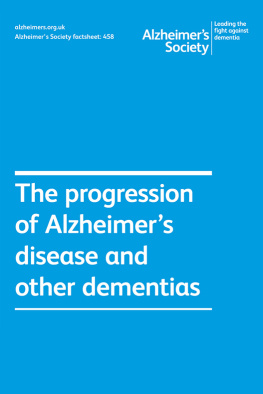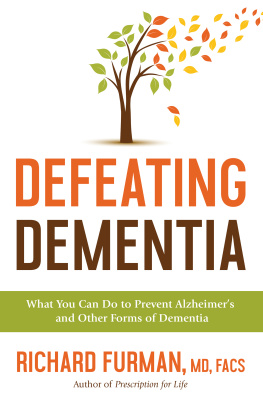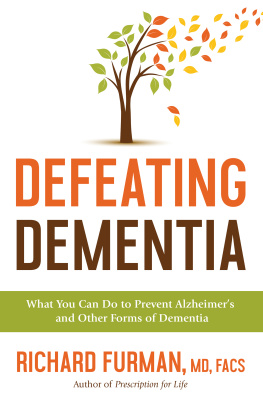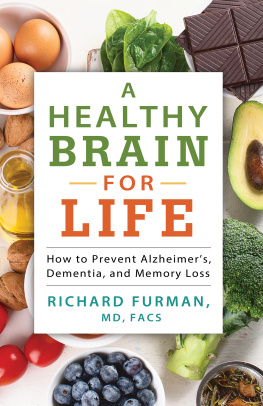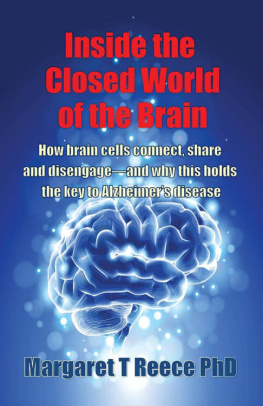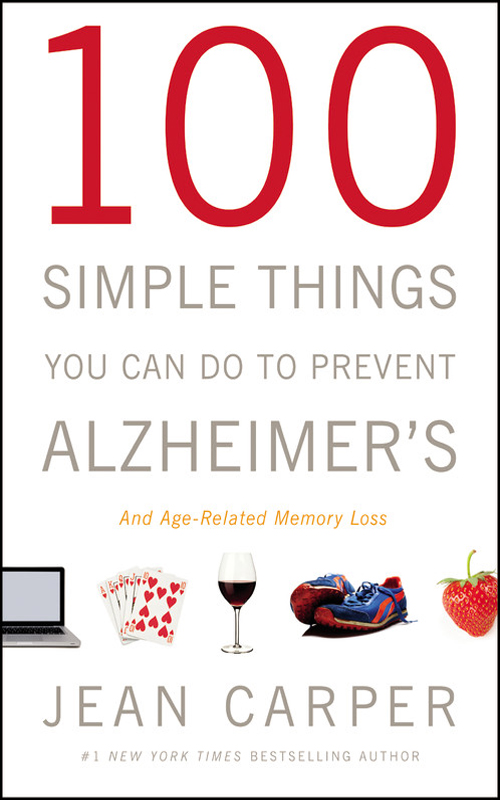Copyright 2010 Jean Carper
All rights reserved. Except as permitted under the U.S. Copyright Act of 1976, no part of this publication may be reproduced, distributed, or transmitted in any form or by any means, or stored in a database or retrieval system, without the prior written permission of the publisher.
Little, Brown and Company
Hachette Book Group
237 Park Avenue, New York, NY 10017
Visit our website at www.hachettebookgroup.com
www.twitter.com/littlebrown
First eBook Edition: September 2010
Little, Brown and Company is a division of Hachette Book Group, Inc.
The Little, Brown name and logo are trademarks of Hachette Book Group, Inc.
ISBN: 978-0-316-12160-6
To my mother, Natella Carper, 19042000, an inspiring spirit who lived ninety-five years without dementia and a final year with probable vascular dementia
And to my sisters, Joan Hickson and Judy Stevens, with whom I share a single copy of the ApoE4 Alzheimers susceptibility gene
As stated by the author, On many levels, Alzheimers research is an exciting grab bag of uncertain theories, despite a hard-core center of scientific belief. Certainty about cause and preventive interventions has not yet been engraved in stone. So while this book includes preventive measures based on research by credentialed investigators, the information and advice contained in this book should not be interpreted as a definitive way to prevent Alzheimers but rather as a guide to suggested measures that may help prevent Alzheimers. This book is not intended to replace the services of a physician, nor does it constitute a doctor-patient relationship. Information in this book is provided for informational purposes only. You should consult your physician or health care professional regarding your care, in particular, with respect to any symptoms that may require diagnosis or medical attention. This book was current as of June 2010, and as new data become available through research, experience, or changes to product contents, some of the information in this book may become outdated. Any action on your part in response to the information provided in this book is at your discretion. You should consult your physician or health care professional concerning any information contained in this book, and follow their professional advice. The publisher makes no representations or warranties pertaining to any information contained in this book and is not liable for any direct or indirect claim, loss, or damage resulting from the use of information contained in this book.
Please note that the author is not active as an investor, owner, consultant, writer, or management participant in any nutritional supplement company or enterprise, and does not profit financially from the promotion or sale of any nutritional supplements.
T heres an amusing saying: Of all the things Ive lost, I miss my mind the most. For some reason, this has always slightly disturbed me, and lately more than ever. Quite accidentally, as the result of a routine blood test for cholesterol factors a few years ago, I discovered that I carry a gene that makes me exceptionally vulnerable to Alzheimers disease. So do my two younger sisters. The gene, ApoE4, is carried by about 25 percent of Americans, and although it is not the only gene associated with Alzheimers, it is the most dominant one so far discovered.
That doesnt mean, of course, that I or others so genetically marked are doomed to develop Alzheimers. But knowing I have inherited this tiny time bomb, which may already be slowly and methodically deconstructing my brain cells and vaporizing my intellect, has dramatically focused my attention on ways to neutralize this threat to my aging brain.
Perhaps I have long sensed I could be a target. For nearly forty years, as a medical and nutrition writer concentrating on the predicament of aging, I have closely followed the research findings on Alzheimers and age-related memory lossfrom the increasingly exciting investigations into basic biochemical causes to the new surge of research into how to deter, slow, or even reverse the pathology and symptoms of memory loss.
As a senior medical correspondent for CNN, I did a documentary in the 1980s on the scientific quest for an Alzheimers cure. My most memorable moment was when world-renowned Alzheimers researcher Peter Davies, PhD, at Yeshiva Universitys Albert Einstein College of Medicine reached into a freezer and produced a slice of an Alzheimers brain, given up at autopsy. It showed large holesenlarged ventricles carved out by the disease. Like a piece of Swiss cheese he volunteered as he put the cold remains into my hand. The image of that diseased brain remains indelibly in my mind. I have often wondered exactly how the biological architect of disease worked to create the void that robbed that particular brain of its function and humanity, and if science would ever be able to stop or prevent the devastation that perhaps might be going on inside my own brain.
Fortunately, many researchers at leading medical centers have wondered the same thing, and applied their inventive minds to solving the Alzheimers puzzle. Over the past twenty-five years, they have learned much about the pathology of Alzheimersand have spun many theories about what makes neurons get sick, become dysfunctional, and die; why brains become abnormally shrunken; and why learning and memory disappear. The pursuit of understanding the disease, of course, is a prelude to an antidote or a curepossibly a vaccine or pharmaceutical potions that may one day magically halt the damage and perhaps even restore a dreadfully emaciated brain back to robust health.
Many experts I talk to think they will ultimately conquer Alzheimers, which now afflicts 35 million people around the world and threatens to become a global tsunami of 115 million by 2050, as increasing life expectancy leaves us with an ever-expanding aged population.
Yet the dilemma of what to do in the meantime has not escaped Alzheimers investigators. Many are shifting their focus to the imperative of preventionthe idea that we should try to head off the awful consequences of the disease before it transforms our brains beyond the point of no return. It is far easier to rescue a sick neuron than a dead neuron, says prominent brain researcher David Bennett, MD, at Rush University Medical Center in Chicago. He and other leaders in the field are vigorously pursuing new ways to identify, prevent, and postpone brain changes and symptoms of age-induced neurodegeneration before they are irreversible.
Eric B. Larson, MD, and Thomas J. Montine, MD, leading Alzheimers investigators at Seattles Group Health Research Institute and the University of Washington, expressed that view in a recent editorial in the Journal of the American Medical Association. The dramatically increasing global life expectancy, they wrote, makes it difficult to overstate the urgency of finding solutions that prevent, delay, slow, and treat Alzheimers disease and related dementias.
You may be surprised to know that many researchers now see Alzheimers and other forms of dementia as diseases of lifestyle as well as genetics. That may soften some of our fear and feelings of helplessness surrounding the disease. Surveys show that Americans over age fifty-five, including me, fear Alzheimers more than any other disease, even cancer, stroke, and heart disease. At the same time, most of us subscribe to the prevailing view that we are virtually powerless to protect ourselves against a disease seemingly so mysterious and cruel as to preclude any possibility of avoiding its onset. That is understandable, but authorities now say it is mostly a myth.


